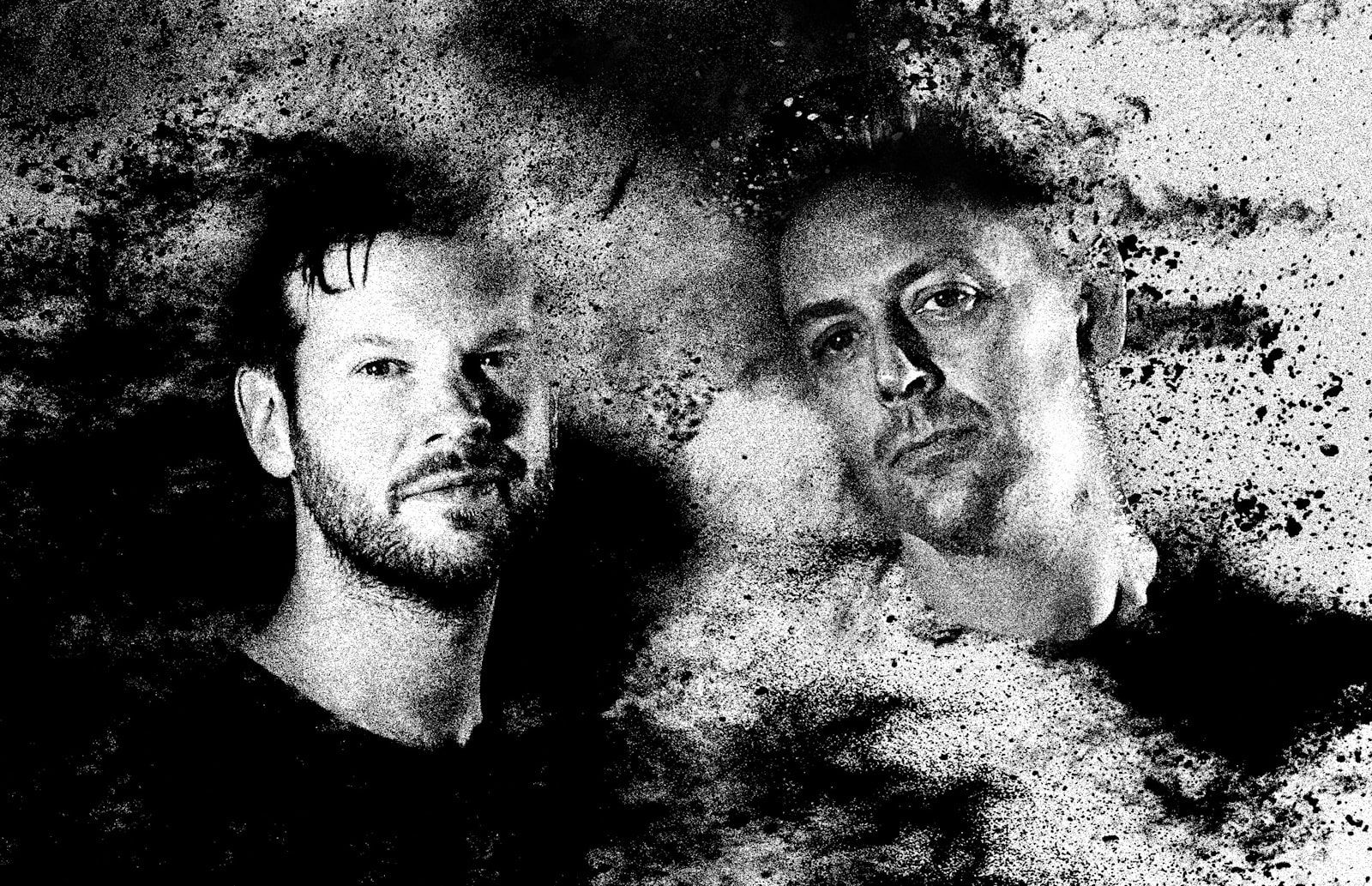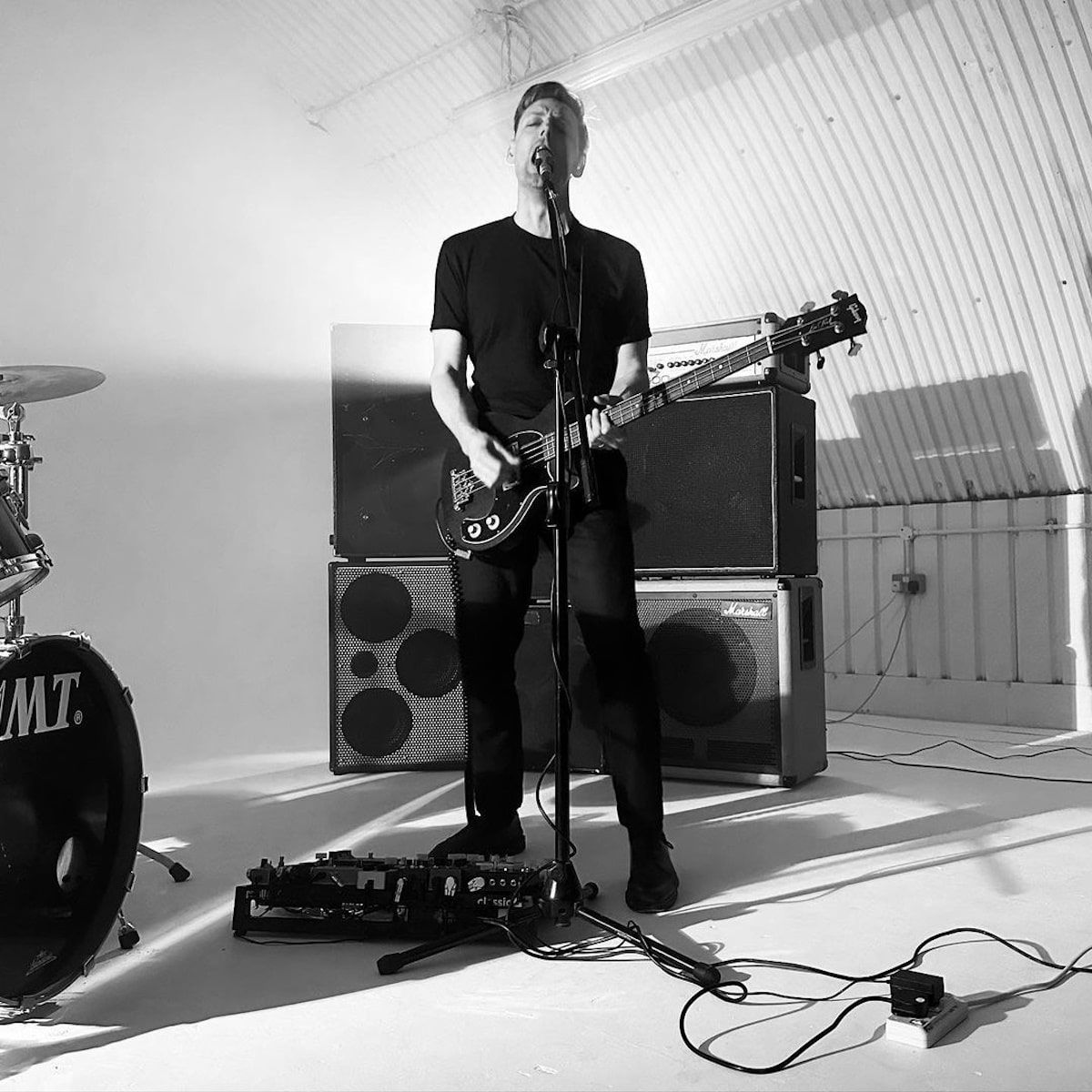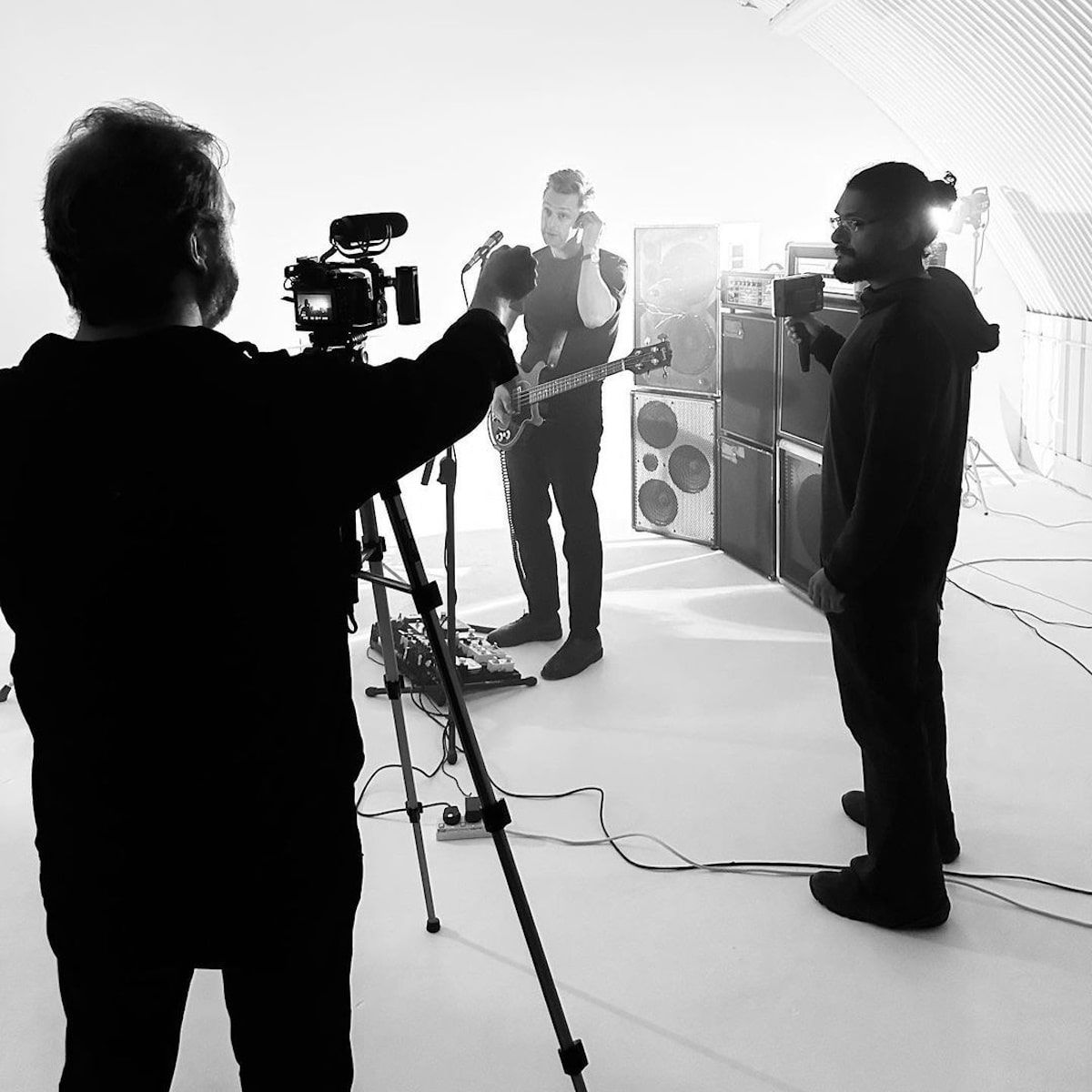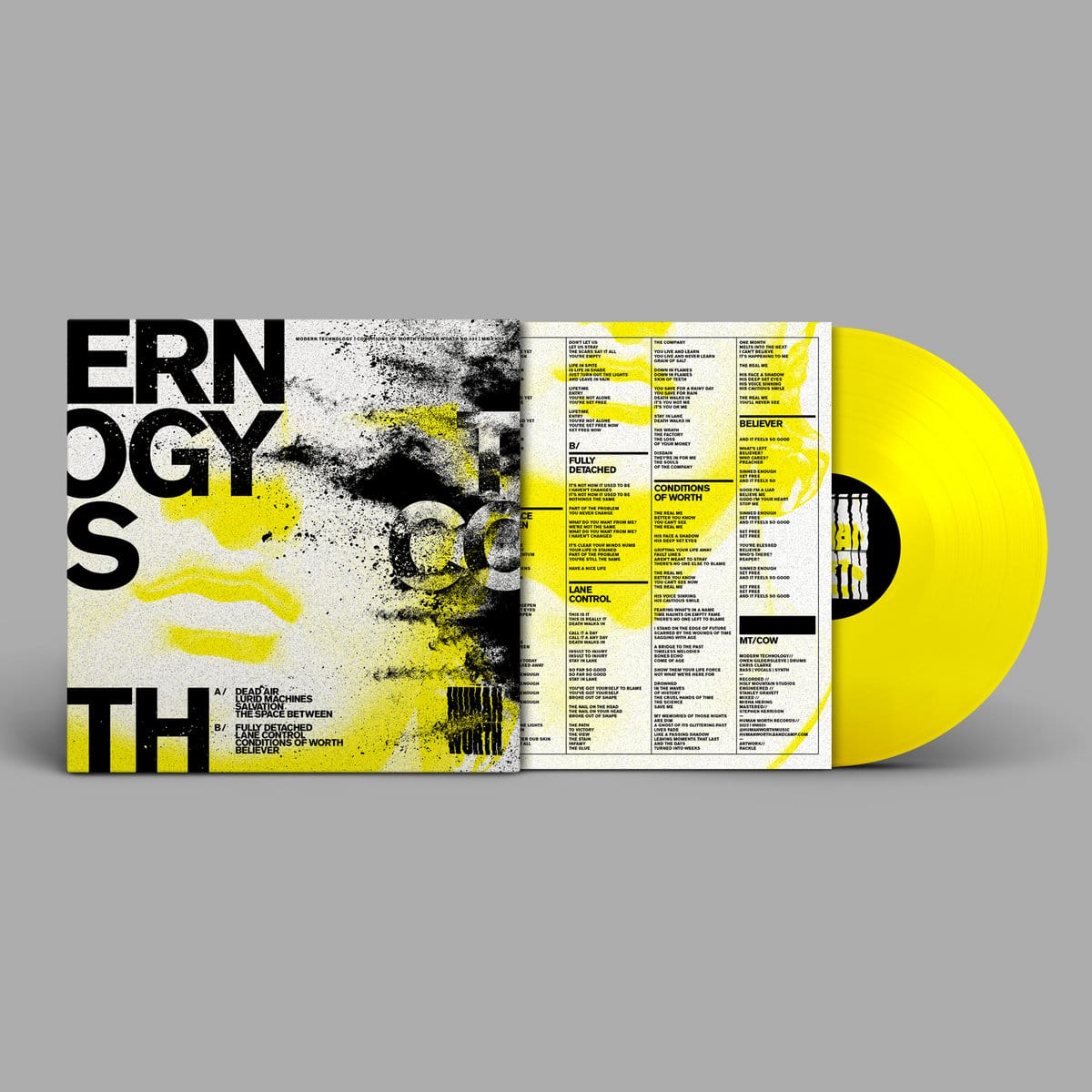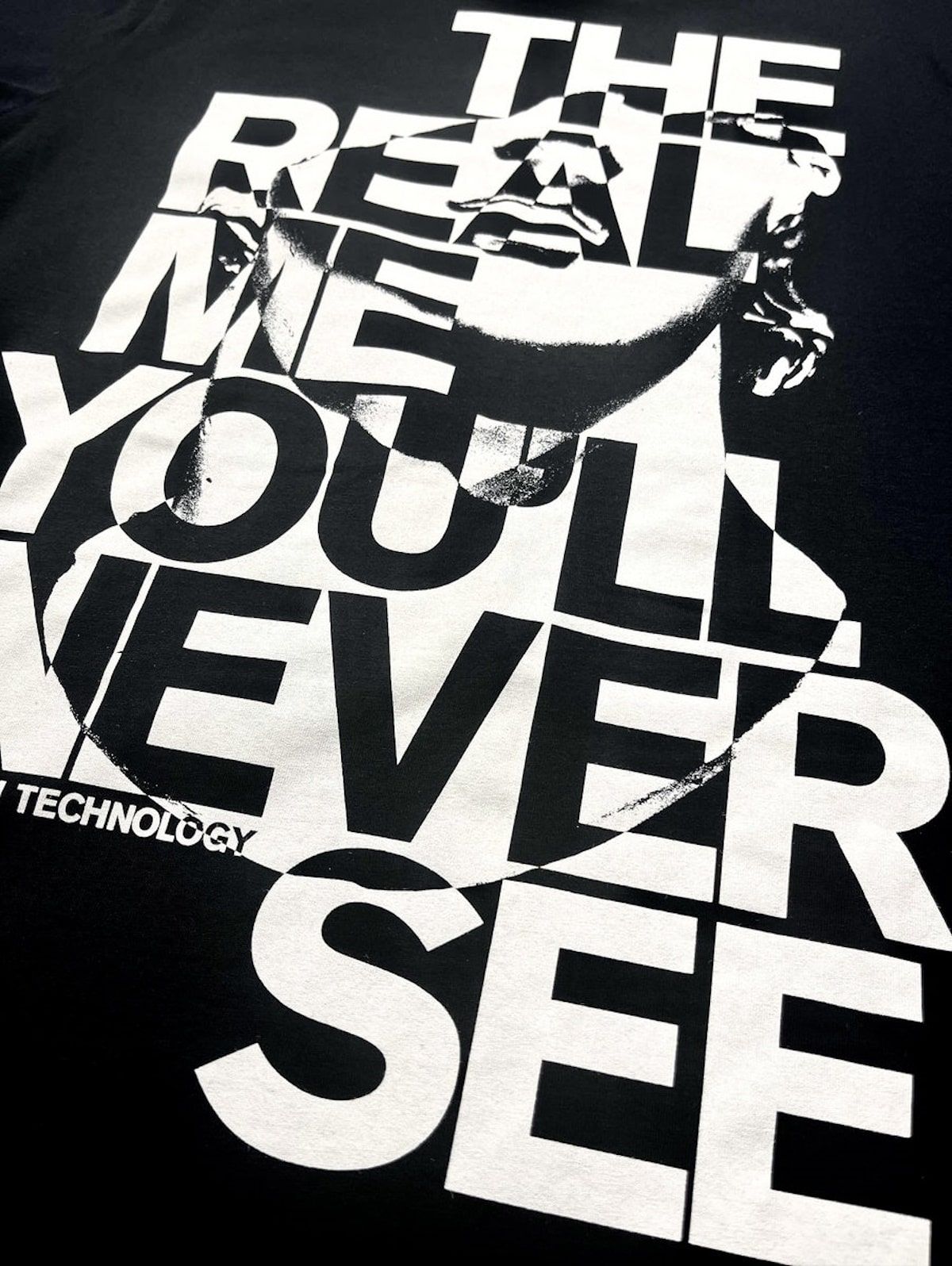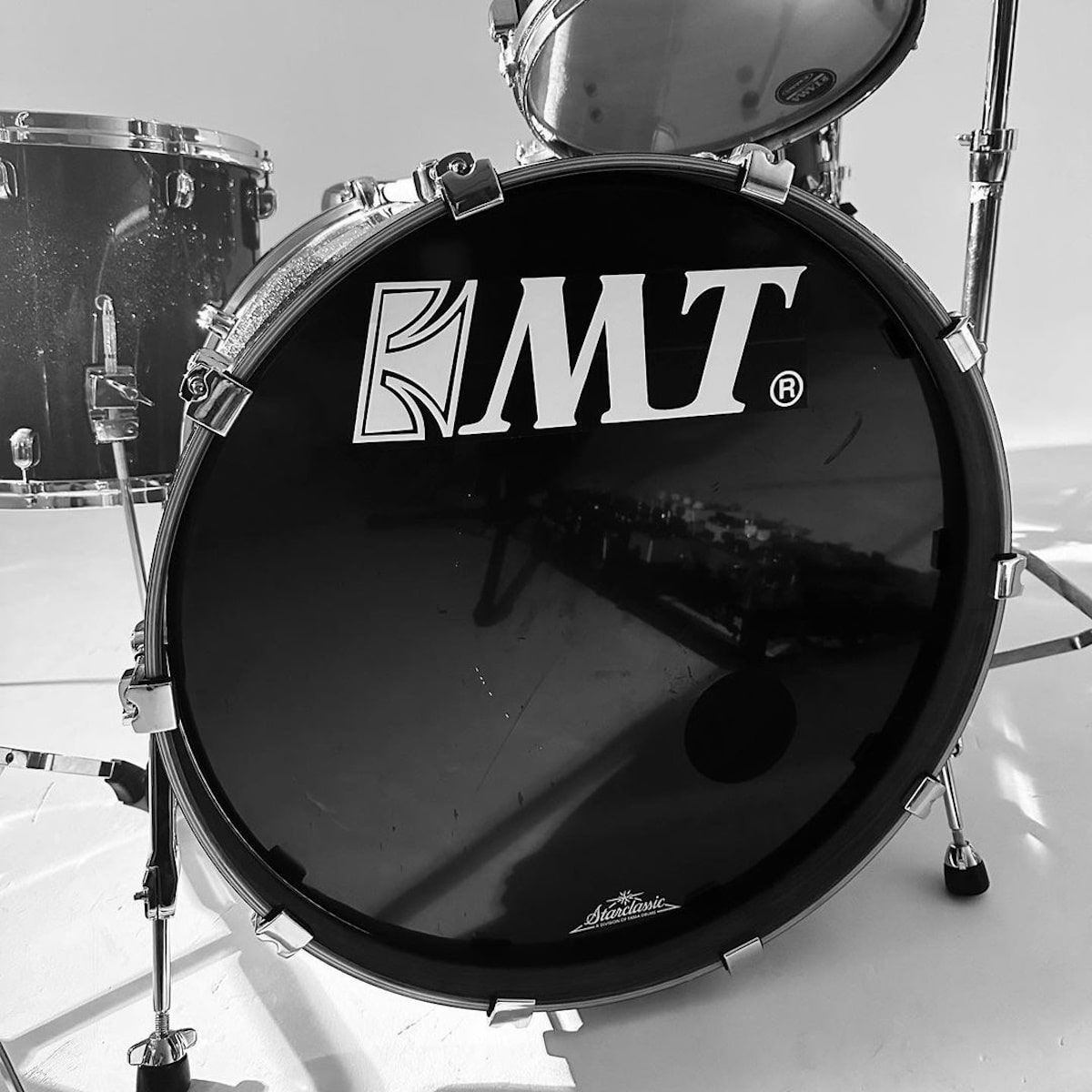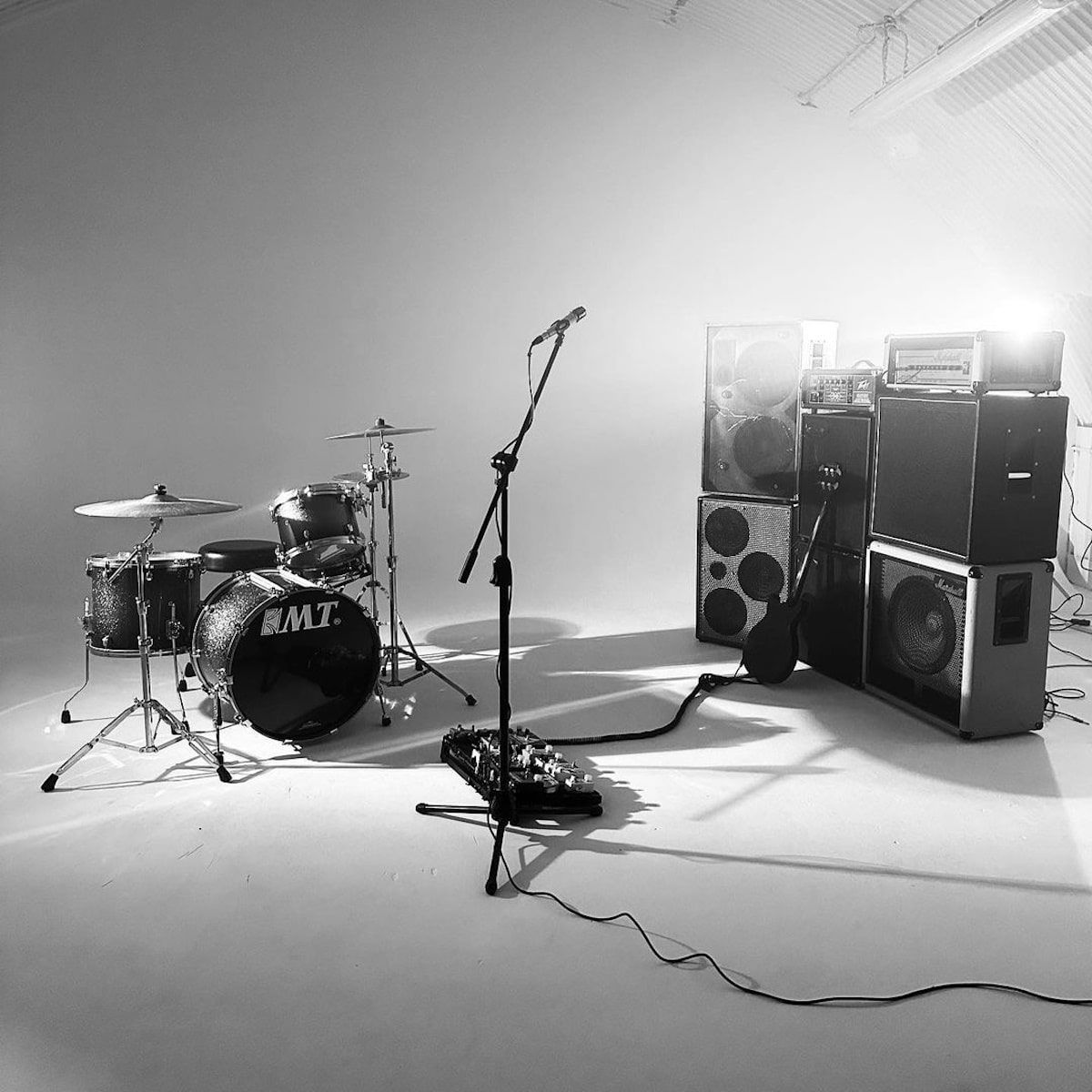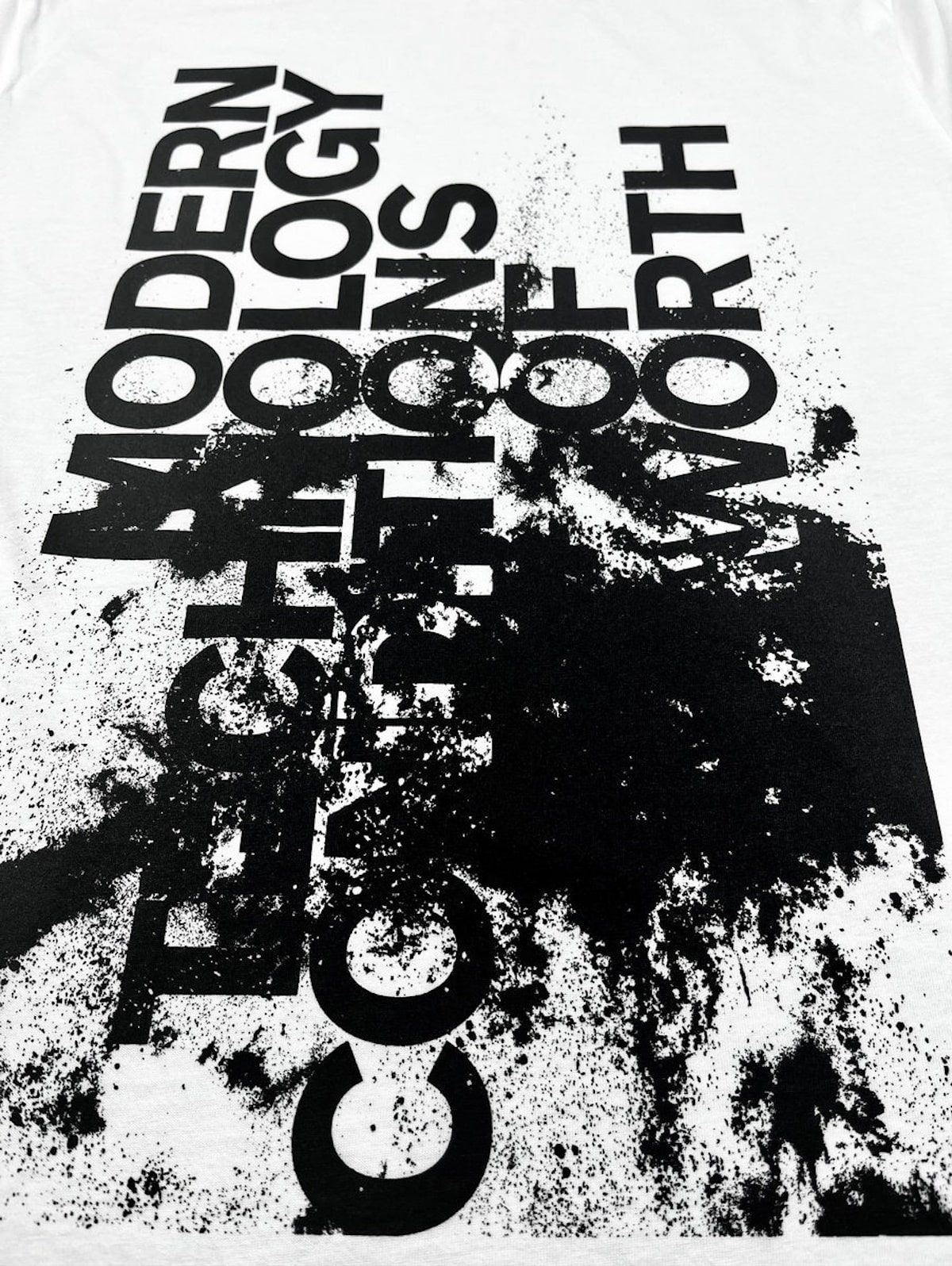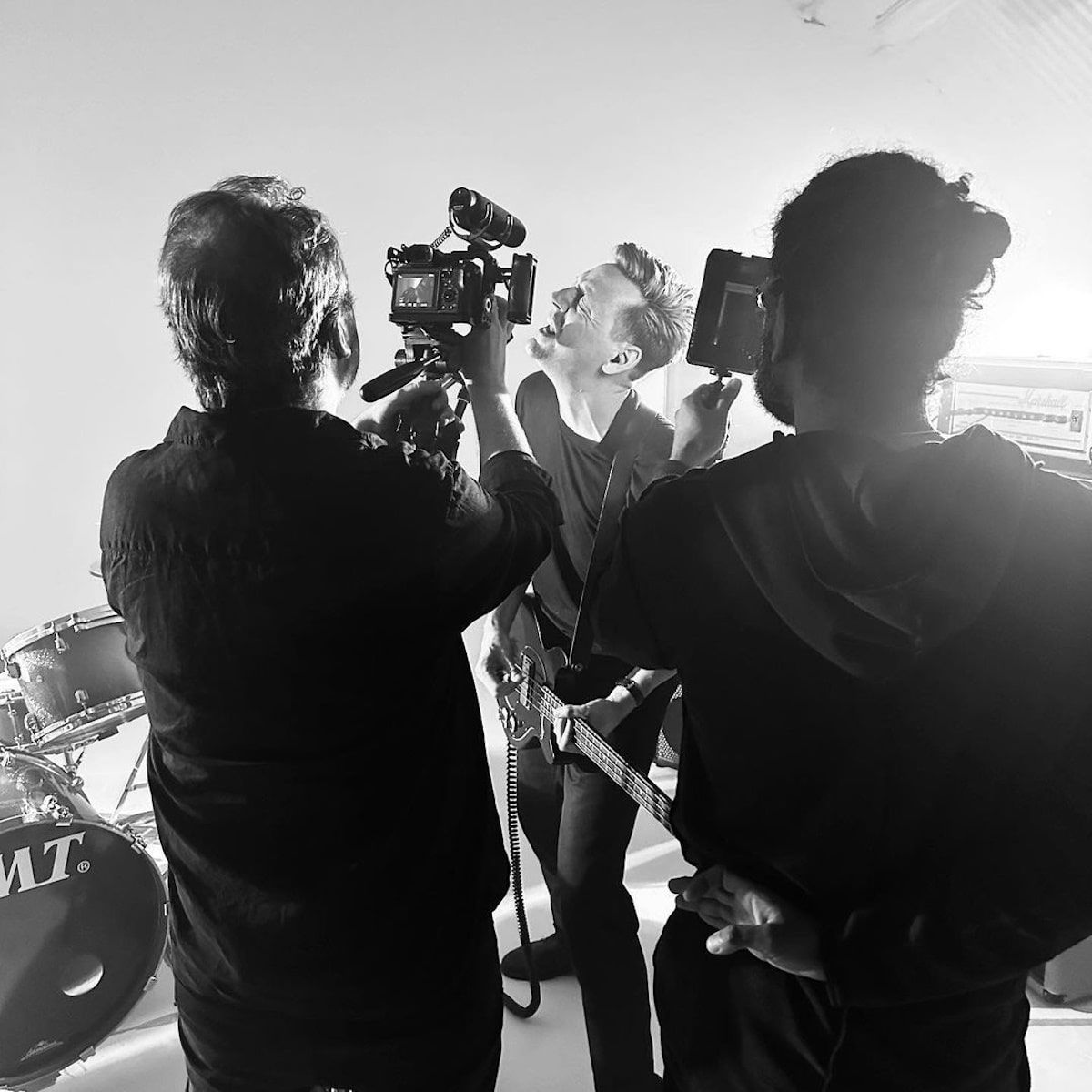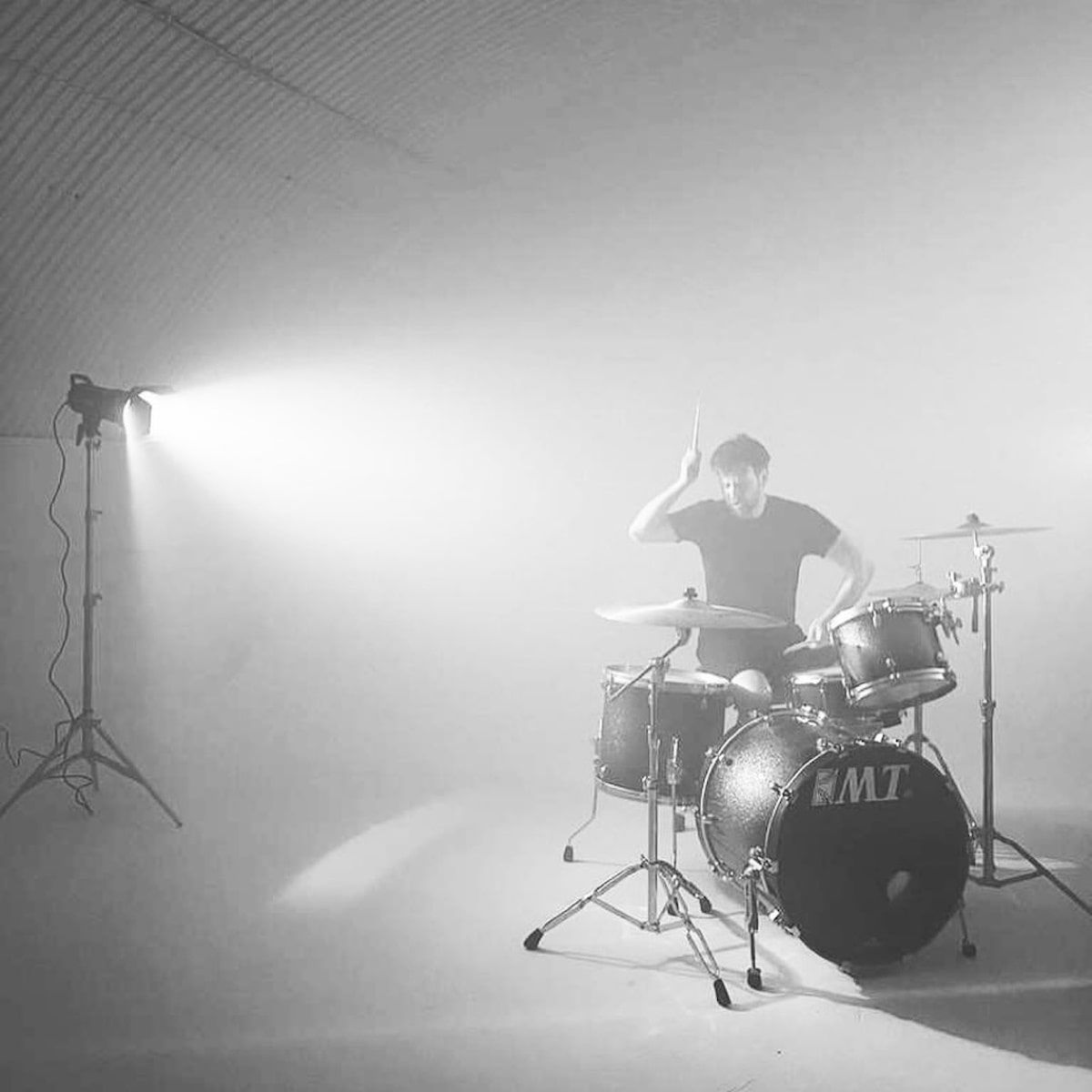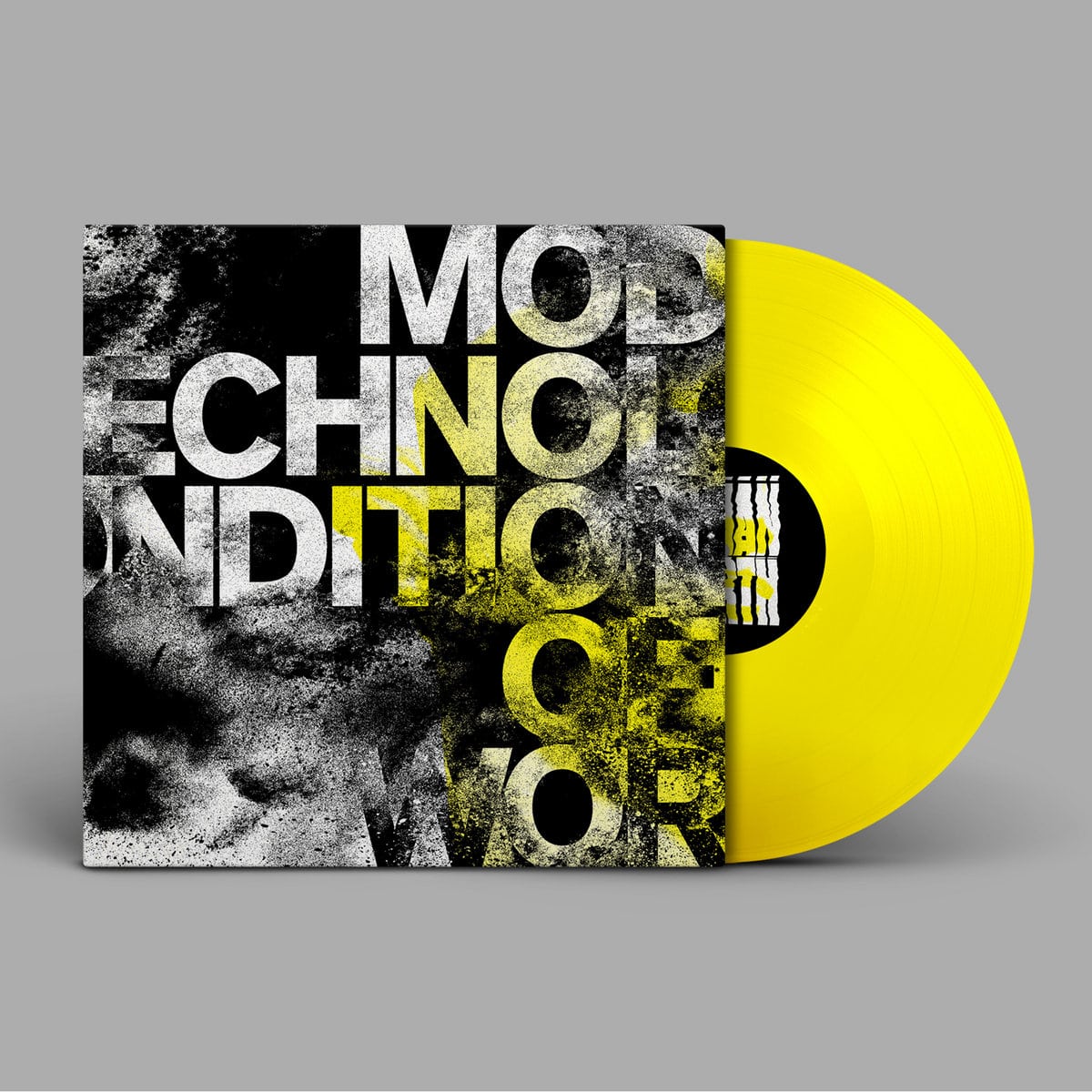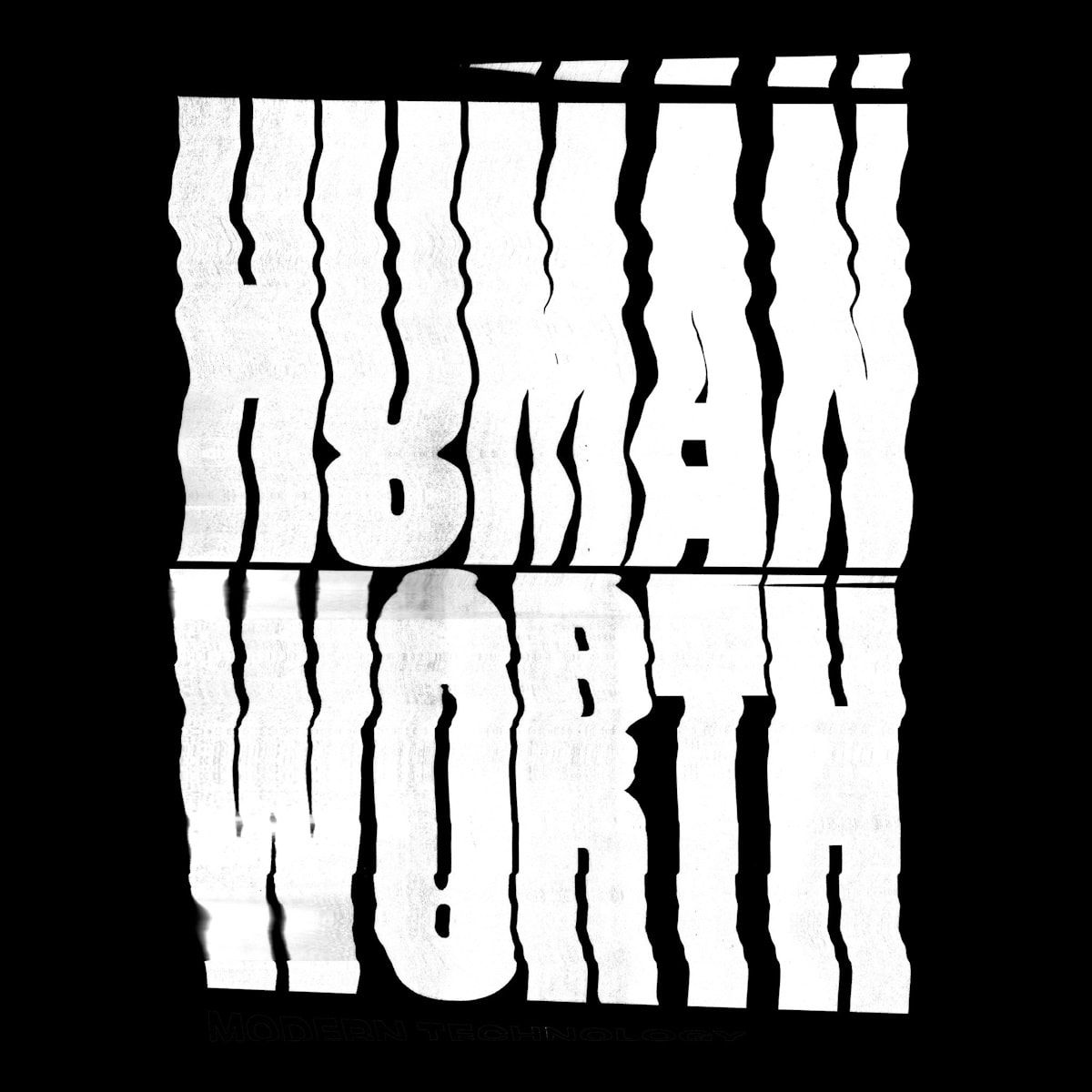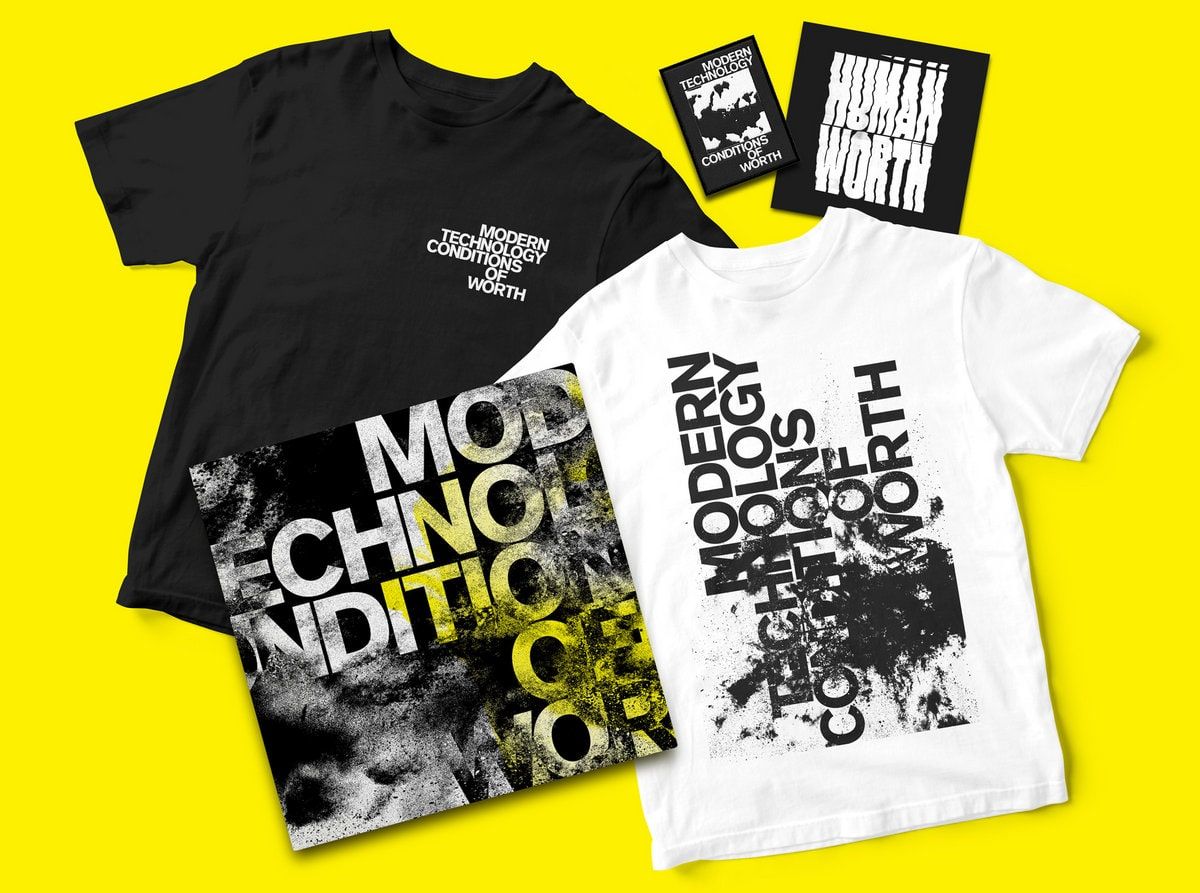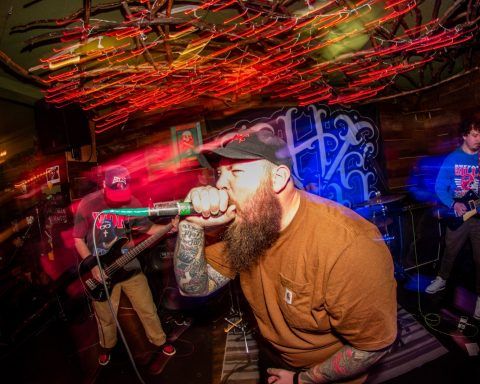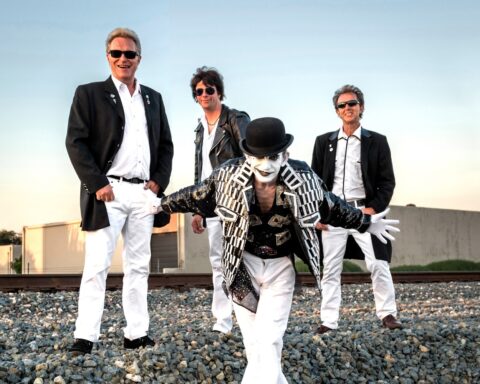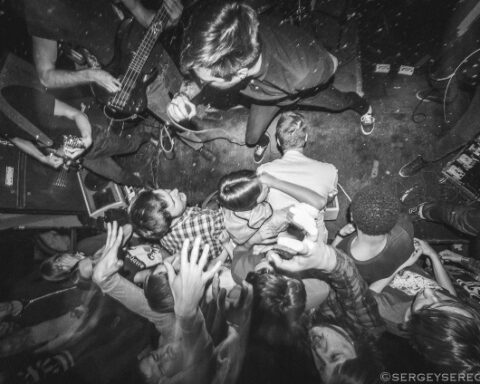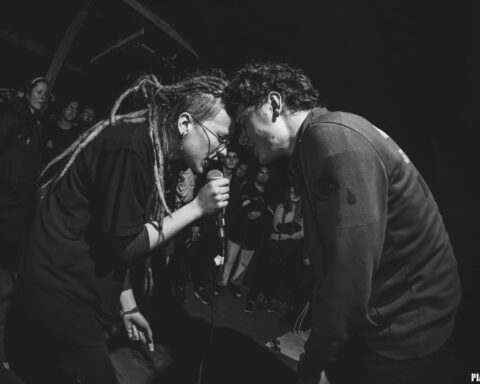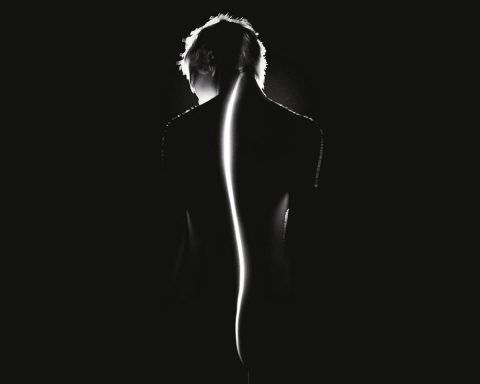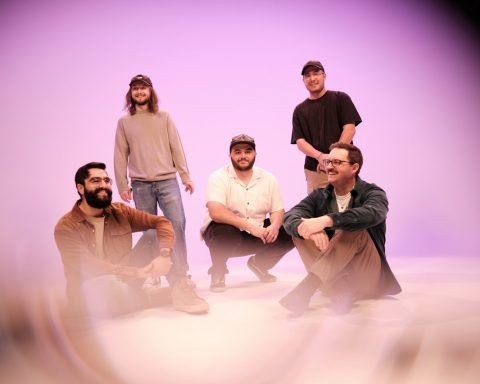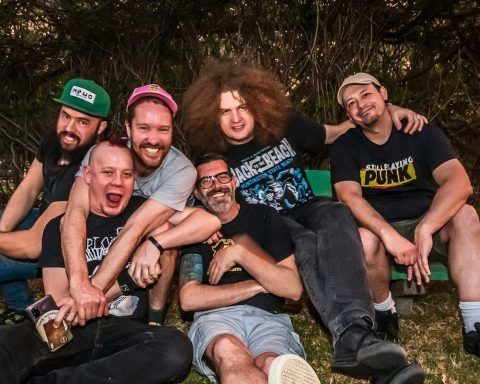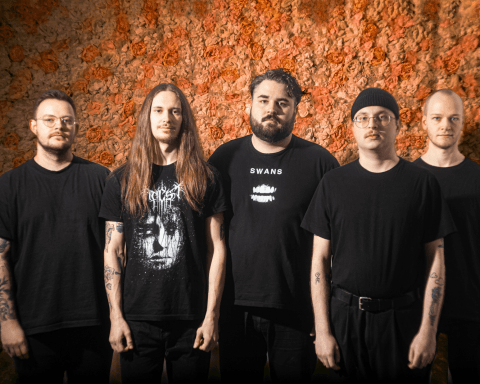Southern UK’s Modern Technology has carved out a curious niche, forming a no-frills dyad that comprises solely of bass and drums. The duo has created what can only be described as an unsettling cacophony, awash in both sonic intensity and thematic heaviness.
The musicians have released their latest offering, “Dead Air,” the first single from their forthcoming album “Conditions Of Worth.” We had an exclusive in-depth conversation with the duo, accompanied by behind-the-scenes imagery of their recording process at Holy Mountain Studios, that will be featured in the following pages.
“Is this how the world ends?”
This disquieting chorus serves as the nerve center of “Dead Air,” encapsulating the song’s thematic underpinnings. The twosome wades through the murk of nostalgia for a simpler past and the ominous overtones of a world becoming increasingly dangerous and illogical.
“Dead Air” envelops the listener in a dense smog of hard-hitting drums, fuzz-layered bass riffs, and acidic vocals.
The Quietus magazine aptly observes, “The heavy and intense brand of noise-rock that’s spat out by London’s Modern Technology is so dense and ferocious, it’s hard to believe the band consists of only two members.”
The artistic perspective of the single is further enriched by a monochromatic music video, conceived and directed by London-based filmmaker Chris Purdie. Stripped of all excess, the video aims to capture the visceral energy that characterizes Modern Technology’s live performances.
“Even devoid of an audience feeding back their energy, the heavy pair showcase the sweat, fury, and unyielding power that makes their exhilarating shows so compelling.”
This sentiment captures the heart of the video: a visual manifestation of the band’s existential dread and concern over the turbulence of contemporary life—themes that percolate through their forthcoming album.
As much as “Dead Air” is a harbinger for “Conditions Of Worth,” it also serves as a cipher for the band’s ethos. It delves into themes of social unrest, austerity, and the climate crisis—pressing concerns that find their way into the lyrical and instrumental fabric of the song. The Ninehertz Podcast describes them as “really creative and off the wall, but still noisy and with an edge to it. A band that sound vital and essential.”
Adding another layer to their message, the forthcoming album will be released via DIY label Human Worth this October 13th, with 10% of sales proceeds earmarked for humanitarian aid.
Thus, Modern Technology doesn’t just create for the sake of art, but ties their work to the betterment of the human condition—a noble gesture, especially in times that often feel so dispossessed of nobility.
So, as the band peers into the abyss of the collective human experience, they invite us all to look with them. Are we willing to face what’s reflected back?
How did the environment of Holy Mountain Studios influence the sonic texture of “Dead Air”?
Owen Gildersleeve [drums]: It was the first time that we’d recorded at Holy Mountain and we were immediately struck by the size and space in the live room. It made for a really nice natural sound, especially on the drums which I don’t think have ever sounded so good! Stan [Gravitt, engineer] and Misha [Hering, producer] were also really keen to try and keep things as pure as possible in the recording, mainly using single layers of bass, with overlays only when necessary and holding onto some of the little uneven moments that happen when recording live in the space. I think that this added space helped to take the pressure off and has allowed us to capture a nice pure live sound, as well as an incredible vocal performance by Chris, making for possibly our most honest recording to date.
Chris Clarke [bass and vocals]: Holy Mountain was the perfect fit for this release. Misha and Stan are incredibly thorough captaining our sound at its most honest. A great deal of time was spent with mic placements and cab choices, choosing to utilise different microphones to enhance different parts of the records arrangements. It’s the first record we’ve done with the drums and cabs in isolation, which felt appropriate this time. It meant the drums could really hold their own rather than being lost amongst the competing bass frequencies.
Owen: The record was perfectly finished off by Stephen Kerrison on mastering duties, who we’ve teamed up with a bunch of times on various Human Worth releases. He has such a fantastic ear and attention to detail, and has been a great supporter of our music over the years – We couldn’t think of anyone we’d trust more with the task!
Can you discuss how your limited setup of just bass and drums has paradoxically expanded your musical vocabulary?
Owen: I’m a person who really enjoys working with limitations, whether it’s in my art or my music – I find I can often get a bit overwhelmed if I have too many choices. Once you know the limitations you can then play within that framework and see how far you can push things. This will then shape how I play the drums, trying to fill the gaps where needed, as well as Chris’ added layers through his pedals. This allows us to really strip back if we want to, embracing those sparse moments in our most basic bass and drum form, as well as going all out wall-of-noise, upping through the pedals and synth layers. I think this playful element has led to quite a varied sound, especially on this album which covers quite a spectrum of different layers and approaches.
Chris: Limitations force creativity. When my musical pallet is infinite, I find I can tie myself up in knots with possibilities. Four strings, two instruments, two amps… And a whole heap of pedals. We shape a lot of the colour through pedals, and stack various levels of gain with different amp textures to create that density. We also utilise a sampler to play the synth parts over the record, these are often applied with the same restraint as our core setup – favouring only a few organ and pad sounds from two synthesises.
What specific techniques do you employ to create your dense, smog-like atmosphere with only two instruments?
Owen: Since our early records, Chris has really delved into his pedals and gear, building up a rig which allows us to build up layers as we progress through songs. For the first time on this record we’ve also started introducing synth drone layers, which Chris triggers from a sampler pedal. Hopefully meaning live we’re able to recreate that full-on sound.
Chris: Layering and contrast mostly. Utilising quiet moments to really accentuate the heavy and vice versa. The vocals do a lot to help too. They deliberately go from more claustrophobic repetitive stabs, into long drawn out expression and everything in-between. Ultimately above all it comes down to being locked in with each-other. That’s when we find it hits the hardest.
What stories, fears, or philosophies shaped the line “Is This How the World Ends?” in “Dead Air”?
Chris: ‘Dead Air’ is set against a post-everything world. A world so battered and gorged on by mankind, where our greed and blind consumerism has finally surpassed our rational thought — It aims to reflect how we can be so blind to the very real threat of existence, by being so focused on ourselves.
The line “Is this how the world ends?” is delivered with a sense of exasperated irony. As an open question to a generation diligently recording themselves, accomplishing so little as the world around them is collapsing.
How do you navigate addressing themes like austerity, social unrest, and the climate crisis without becoming overwhelmed by despair?
Chris: I mean, I am. Since having a son (with another on the way) — these very real, and vivid themes are in greater focus for me. It does however feel positive to reflect on them and I certainly find it a cathartic release to pair these expressions verbally with a sonic voicing that embodies how I (we) are feeling about the future we’re leaving for the next.
How did the solitude and social distancing during the pandemic affect the music and lyrical content of “Conditions Of Worth”?
Chris: Isolation and uncertainty is very apparent in this record, and certainly is reflected thematically throughout. Although not a concept album, the arrangements within the full-record are one of the same path. There is a great sense of having very little control — which is certainly something reflective of the pandemic. The lack of control is weaved throughout as the protagonist is forced to reflect and sometimes seek guidance in a higher power.
The higher power morphs from acceptance from social media (‘Lurid Machines’) into false idols (‘Salvation’) and finally into a god. (‘Believer’) as we go further up the ladder, only to realise it was too late.
How important was capturing the live energy of your performance in the music video for “Dead Air”?
Chris: It felt urgent. Removing any unnecessary background, and distraction felt like an appropriate setting for a song that is stark and urgent in its construction.
Owen: I’ve always been drawn to performance music videos, showing the band playing their songs. I think it helps translate the music better than any story or narrative. I think that’s come from my love of live shows and the energy you gain from seeing a band giving their all. As a live band ourselves we often give everything we have into our performances and felt that this song would be best portrayed by capturing that energy in the video.
We’d been chatting with Chris Purdie about teaming up since our last record Service Provider, but a live video wasn’t possible or appropriate because of the pandemic lockdowns. So it’s really great to finally get to team up on this one, and in a way it feels like a more fitting time to bring him in – on a record we’re truly proud of!
Chris Purdie, known for capturing metal bands in a live setting, directed your music video. How did his style align with the ethos of Modern Technology?
Chris: His honesty. In reflecting a band as they’re most honest. We’ve always admired his detail and ability to capture the subtle moments within a live setting.
Owen: Chris is a true craftsman, and what he manages to capture in the live space, just by himself with a single camera is truly masterful! He’s filmed a few of our live shows in the past and we’ve always loved his footage. Also as a musician himself he really understands the live space and those key moments when to cut to one musician or the other for the greatest impact, more so than many filmmakers we’ve seen in that same field.
We reached out to Chris and started taking him through the themes of the track and our idea for the video – playing ‘Dead Air’ live in the space, in stark black and white, with us slowly being engulfed by the “toxins” as we progress through the song. He immediately got the idea and brought up some great references that perfectly matched what we’d had in mind. Then on the day he really commanded the space, knowing exactly what angles would work best for the various moments and energy we were trying to capture, and we couldn’t be more stoked with the final result!
Can you delve into the “Utility Yellow” vinyl choice for the upcoming album? Is there a symbolic or aesthetic reasoning behind it?
Chris: Absolutely, It was chosen for its urgent, brash and poisonous aesthetic. The album themes deal with a toxic environment and the lurid, abrasive record seeks to reflect that. The utility and factory references are a nod to the high-vis warning signs within industrial settings.
How does Modern Technology fit into and influence the southern UK noise/sludge rock scene?
Owen: Chris and I were quite new to the scene when we first began, having both played in bands in our teens and then almost giving up on music when we both separately moved to London, feeling that we should focus on our careers instead. We later met and bonded over our shared musical interests, which eventually led to us jamming and creating music again, for the first time in years. But we’d been away from the scene for so long that when we eventually did start putting together our debut EP we had no idea who might listen to it or even be interested in what we’re doing.
So it was kind of thanks to Wayne Adams [London based producer and engineer] – who we worked on for that first record and who is very much a figurehead of the scene – that we were able to build out a community as news of our release was shared. Another label Cruel Nature Records based in Newcastle, run by legend Steve Strode, also picked up that EP and helped spread things further, leading to some shows as well as interest up North. This has been such an important part of our journey and is what eventually led to me starting Human Worth, which has now become a bit of a new hub for the UK DIY noisy scene and we’re proud of the community we have built through the shared love of alternative music.
You’ve performed with a wide range of acts, from Luminous Bodies to Part Chimp. How have these experiences shaped your own approach to live performances?
Owen: We never anticipated being in this kind of place we when started off and I feel so lucky to have shared the bill with so many truly incredible bands. Part Chimp are real idols of ours, so even just getting to see our name alongside them felt like an otherworldly moment for sure.
Your label Human Worth directs a portion of sales proceeds to humanitarian aid. How does this charitable aspect intertwine with the band’s identity?
Owen: As we started piecing together our debut self-titled EP we had a chat about funds and any potential money we’d make. The whole record explored themes of societal disarray, the effect of austerity and emotional and mental struggles, and so we realised it would be fitting to put our money where our mouths were, and we decided to donate any potential profits to charities who help tackle these issues.
We also put together a charity album launch show to release the record, with bands like Bruxa Maria and Lump Hammer joining the bill, and we named the night Human Worth after the final line from the debut EP “What’s one more human worth?” The turnout was wonderful and we raised some great funds for charity. We realised that the warmth we felt from this process, and being able to help people through our music, was something that felt right and that we’d like to continue.
So I ran with this, setting up the Human Worth label during the pandemic lockdowns. We began with a series of charity compilations, bringing together a bunch of friends we’d met through our music. Seeing things progressing we then decided to put out our debut first full-length Service Provider as Human Worth’s first physical release. Things went so well that we started getting approached by other bands and everything has kind of snowballed from there. I’m very much enjoying the journey so far and it has been wonderful to see so many people get behind the label and what we’re doing!
Do you feel an obligation to speak for your generation, or are you more so narrating a personal journey through the chaos?
Chris: From the beginning we always felt it was a privilege to write, perform and create music. It was always jarring for us to not use it as a platform to express generational disquiet. Having this focus always gave it a clear goal, and a clear reason for existing beyond our personal gratification as a cathartic way to exercise our displeasure. Or else what is the point of it?
You’ve said that “Dead Air” is about the world becoming increasingly dangerous and inhospitable. How does this tie back to the title of your upcoming album, “Conditions Of Worth”?
Chris: Good question, ‘Dead Air’ as the lead-off track sets that backdrop for the rest of the tracks to build from. As said previously it is deliberately exhausted and toiled, it is in many ways the last urgent cry.
It reflects a world where we’re so distracted by the perception of ourselves — and the evolution of individuals as content; a commodity to be sold, rather than nurtured — that we’ve neglected the reality unfolding behind. It is that juxtaposition the record largely deals with. The conflict between narcissism and our addiction to our sense of self worth in stark contrast to the vivid and urgent catastrophes, environmental degradation, climate, war, famine, abuse that endanger and are destroying modern civilisation.
How has the sound of Modern Technology evolved since your earliest work, and what can fans expect to hear in the new album that’s different from the past?
Owen: I think there’s still the same level of passion and energy as those early recordings, and we’re still trying to carve our own path – without being too influenced by the other bands we’re surrounding ourselves with. The main developments have been in our use of layers and what we’re able to create as a two-piece, with Chris devising new ways of creating and outputting sounds through his now monstrous setup.
We’ve also spent a lot of time working on the sequence of music. In the past our records would be pulled together from lots of parts, with tracks being re-shuffled or discarded in the recording stage. But this time we had a really clear idea of how we wanted to structure the album, with a strong sequence of events in mind, as well as playful moments of repetition throughout the songs, with riffs reappearing throughout the recording. It’s made this album feel like a full body of work, and we’re super proud of the result.
Raw Power Festival was one of the platforms where you’ve performed. How do such festivals contribute to or shape your creative expression?
Owen: These festivals are so important, showcasing bands from the depths of the weird and wonderful DIY scene and bringing them in front of lots more faces. Playing Raw Power was a really big moment for us – probably the largest crowd we’d ever played to at the time – and it kickstarted a lot of things for us, as well as bringing us together with the community.
I’m super sad that the festival has now called it a day, as well as a bunch of other amazing promoters we’ve previously teamed up with across the country. It seems like a really tough time for music promotion, with people a lot lower on funds and more tentative about buying tickets upfront. Hopefully it will turn around and people will come in to take their places, as these events, showcases and festivals are really so important for the DIY scene and the music we create.
Your music often leans toward the experimental. Are there any non-musical influences that you incorporate into your sonic palate?
Owen: Art and design are always huge influence of ours and I find that those inspirations often feed into our musical output, through the ways we promote and package our music, pushing the narrative that weave through our music.
What’s your message to fans who resonate with your raw and ferocious energy but find it difficult to grapple with the hard-hitting themes?
Chris: Channel it somewhere productive. Feeling like you’re making a change, however insignificant it may feel to you, it matters.
Lastly, the album is named “Conditions Of Worth.” How do you define ‘worth’ in an era of uncertainty and absurdity?
Chris: Conditions of Worth, by definition are “the proposed rules that govern values, beliefs and behaviors”.
The record largely deals with the conflict between these conditions, and an imposed societal value. When you really dwell on the phrase, it’s disgusting. If we break these rules, we expect to receive disapproval or rejection. They become part of our self-concept, and we accept them as the truth rather than as an opinion.
We are saturated by these imposed conditions, everything we touch, do and consume is exposed to public scrutiny. This has been amplified by ourselves being the commodity we sell — as touched on earlier, so blinded by vanity and narcissism it masks our shared calamity.
Personally for me, I hate the phrase. I hate the word “worth”. I hate the feeling of being valued off others’ perception. I judge my value from my impact on others, and the small differences we can make to one and others lives.
Follow Modern Technology via social media and check out their most important links here.



